

Auguste Comte. Isidore Auguste Marie François Xavier Comte (19 January 1798 – 5 September 1857), better known as Auguste Comte (French: [oɡyst kɔ̃t]), was a French philosopher.
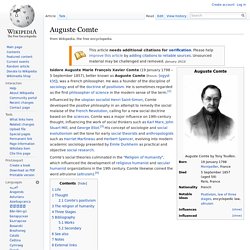
He was a founder of the discipline of sociology and of the doctrine of positivism. He is sometimes regarded as the first philosopher of science in the modern sense of the term.[2] Influenced by the utopian socialist Henri Saint-Simon, Comte developed the positive philosophy in an attempt to remedy the social malaise of the French Revolution, calling for a new social doctrine based on the sciences. Comte was a major influence on 19th-century thought, influencing the work of social thinkers such as Karl Marx, John Stuart Mill, and George Eliot.[3] His concept of sociologie and social evolutionism set the tone for early social theorists and anthropologists such as Harriet Martineau and Herbert Spencer, evolving into modern academic sociology presented by Émile Durkheim as practical and objective social research.
Life[edit] Global Power Networks. Chris Lucas "Government is not reason; it is not eloquence; it is force !
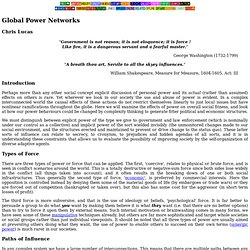
Like fire, it is a dangerous servant and a fearful master. "George Washington (1732-1799) "A breath thou art, Servile to all the skyey influences. "William Shakespeare, Measure for Measure, 1604-1605, Act: III Introduction Perhaps more than any other social concept explicit discussion of personal power and its actual (rather than assumed) effects on others is rare. We must distinguish between explicit power of the type we give to government and law enforcement (which is nominally under our control as a collective) and implicit power of the sort wielded invisibly (the unmonitored changes made to our social environment, and the structures erected and maintained to prevent or drive change to the status quo). Types of Force There are three types of power or force that can be applied. Engineering a New World: Technocracy and Transformation - Part 1. Entering a New Millennium. Chris Lucas "It is the calling of great men, not so much to preach new truths, as to rescue from oblivion those old truths which it is our wisdom to remember and our weakness to forget.
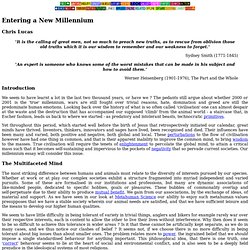
"Sydney Smith (1771-1845) "An expert is someone who knows some of the worst mistakes that can be made in his subject and how to avoid them. "Werner Heisenberg (1901-1976), The Part and the Whole Introduction We seem to have learnt a lot in the last two thousand years, or have we ? Yet throughout this period, which started well before the birth of Jesus that retrospectively initiated our calendar, great minds have thrived.
The Multifaceted Mind The most striking difference between humans and animals must relate to the diversity of interests pursued by our species. We seem to have little difficulty in being tolerant of variety in trivial things, anglers and bikers for example rarely war over their respective interests, each is content to allow the other to live their lives without interference. Common Sense. Fourth World Thinking, Transcending the First Three. Chris Lucas "What one thinks, what one feels, the agony, the suffering, the ambition, the envy, the extraordinary confusion one is in, that is the world.
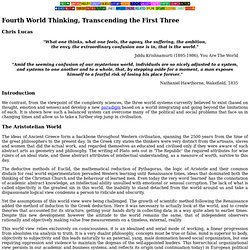
"Jiddu Krishnamurti (1895-1986), You Are The World "Amid the seeming confusion of our mysterious world, individuals are so nicely adjusted to a system, and systems to one another and to a whole, that, by stepping aside for a moment, a man exposes himself to a fearful risk of losing his place forever. " Global Civil Society v Totalitarianism.
Hendrik Christian Andersen. Hendrik Christian Andersen (April 15, 1872, in Bergen – December 19, 1940, in Rome) was a Norwegian-American sculptor, painter and urban planner.
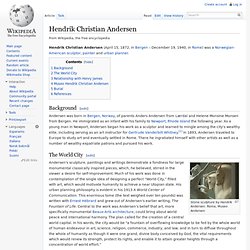
Background[edit] Andersen was born in Bergen, Norway, of parents Anders Andersen from Lærdal and Helene Monsine Monsen from Bergen. He immigrated as an infant with his family to Newport, Rhode Island the following year. As a young man in Newport, Andersen began his work as a sculptor and learned to mingle among the city’s wealthy elite, including serving as an art instructor for Gertrude Vanderbilt Whitney.[1] In 1893, Andersen traveled to Europe to study art and eventually settled in Rome. There he ingratiated himself with other artists as well as a number of wealthy expatriate patrons and pursued his work. The World City[edit] Stone sculpture by Hendrik Andersen. Evident in the treatise is Andersen’s philosophy that art could change humanity and produce perfection. Relationship with Henry James[edit] Museo Hendrik Christian Andersen[edit]